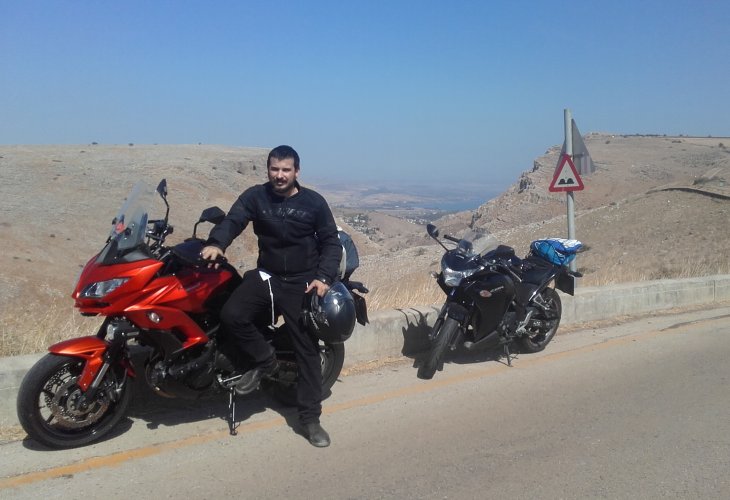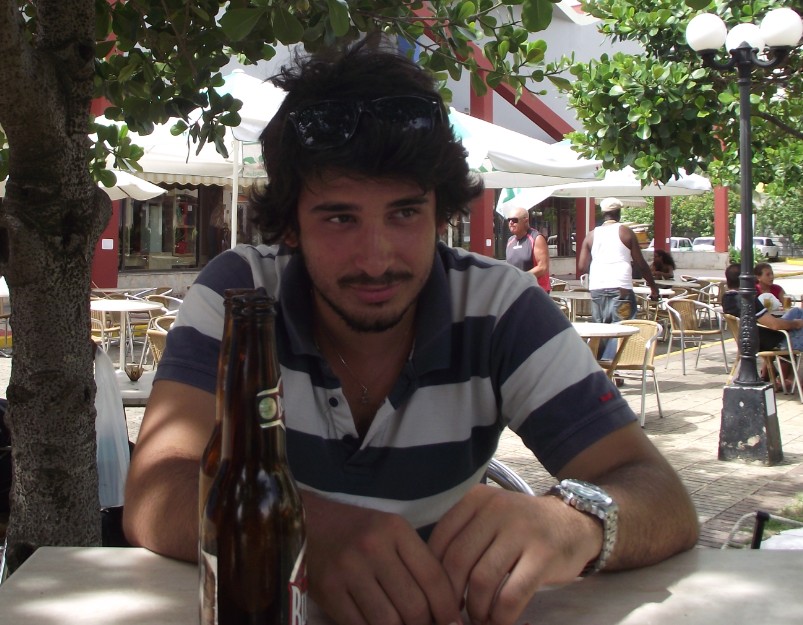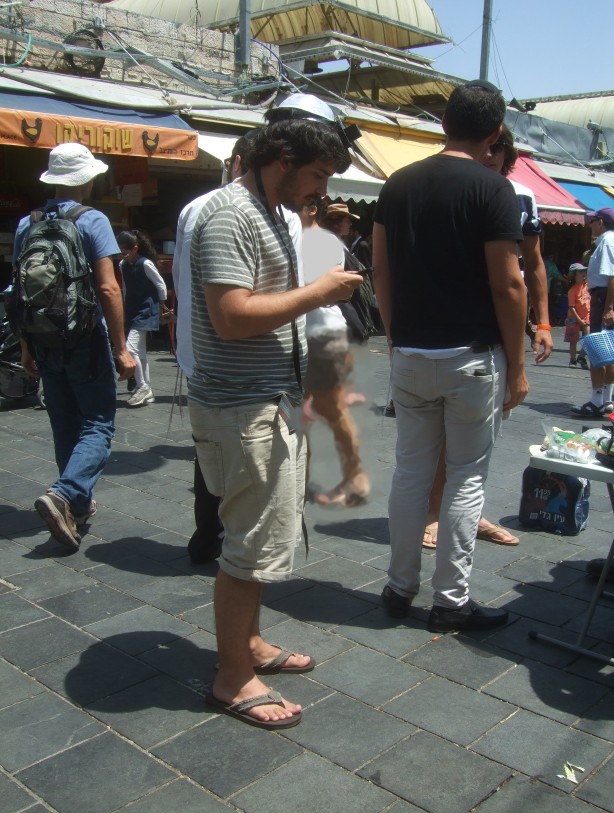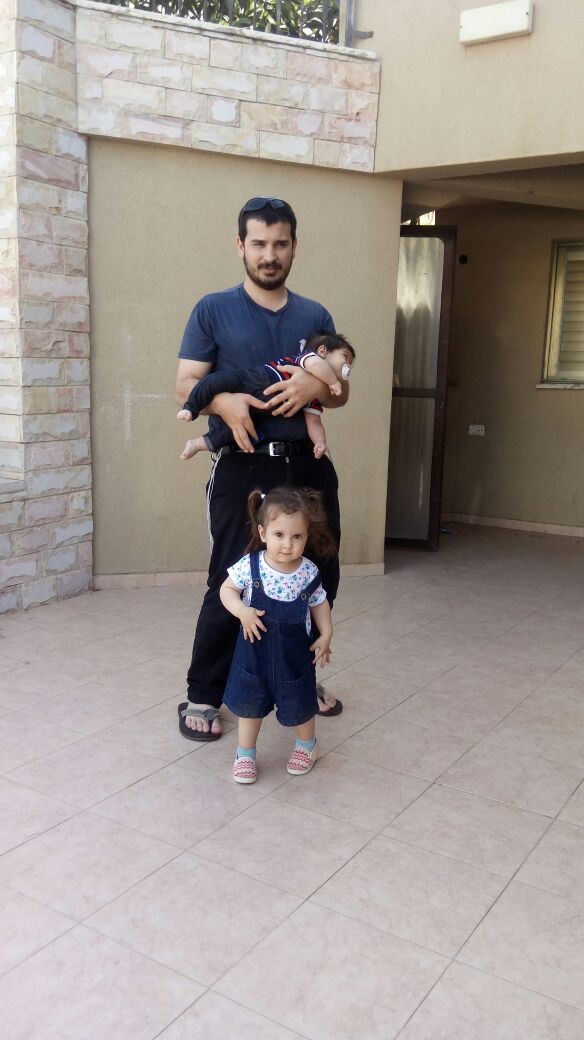From Cuban Communism to the Hills of Samaria: The Life Story of Convert David Marcelo
A cross-continental burial journey of an assimilated David, a critical couple's decision, and a secret letter that changed his family's future forever. An exclusive interview with David Marcelo Couchman.
 David Marcelo
David Marcelo"I have carried this story with me for years, my story, but I almost never shared it with anyone. I just didn't think it was special. When I started telling it, half by mistake, people were very moved, so I thought of doing it more," says Marcelo David Couchman, 27, married to Romi with two children, living in Karnei Shomron. Couchman, a convert who made a long journey to Judaism, takes a deep breath and begins to unfold his story to me.
"I was born in Cuba, which is essentially an island in Central America, during the days when the regime in the country was a totalitarian communist one. For many years, the idea of religion and faith was forbidden in Cuba, and therefore almost all the Jews fled from there. When I was five, my great-grandfather passed away, and a few days later, we discovered a letter he left for us.
"Grandfather, and this really moves me to think about it today, wrote to us that he was Jewish. When I was five, significant changes occurred in Cuba, and the matter of religion changed greatly. The prohibition on religious ceremonies and everything that accompanied it was lifted. Consequently, it became permissible to gather in synagogues, and thus, at age five, I heard for the first time about the existence of Hashem.
"Following the letter that grandfather left, we began to connect with the Jewish community there, which was Reform, by the way. From here to there, our bond with Judaism and Israel strengthened, and somehow we ended up immigrating to Israel, even though we weren't Jewish at all. My mother wasn't Jewish, neither was her husband – my stepfather, and of course, neither was I. Anyway, we underwent a Reform conversion and immigrated to Israel.
"Today, it sounds of course absurd to me," Marcelo recounts, "but until age 16 I was sure I was Jewish, and ultimately I was like any of my secular friends, so it didn't have real significance. However, for my mother, it didn't seem enough, and when I was 16, she told me we were entering a conversion process. I started the process with her, but in the middle, they told me I had to move to a religious school, and I disagreed, so I simply stopped halfway."
 Marcelo before the change
Marcelo before the changeDidn't it bother you to be non-Jewish in the society you lived in?
"Honestly, not at all. It didn't bother me at all. I lived in a secular society, and for me and all my friends, it didn't have any significance. A few years later, when I was in the army, I heard there's something called the 'Path' course, through which one could convert. They told me that initially, you just learn various things related to Zionism and Judaism, and those who wish can continue later to seminars and complete the conversion process properly."
The toughest choice
According to Marcelo, and this also comes up in many conversations with people who got closer to Judaism, what especially sparked the desire within him to strengthen in Torah and mitzvot are the issues of character development in the Torah, as well as its psychological aspect. "I am very connected to the human soul and psychology," Marcelo shares, "and so I decided to continue with the conversion to a full one. A short period before the immersion stage, I met Romi, who would later become my wife. I was then working in a café that was open on Shabbat. She was the shift manager, and slowly, we began to become friends.
"Over time, the relationship grew stronger, but before one Shabbat, I faced a big dilemma, even distress. Shabbat was approaching, and I already wanted to observe Shabbat at that time, and I was very torn whether to start observing Shabbat or to stay with Romi. I thought I had to decide because if I told Romi that I'm starting to observe Shabbat – she would probably leave me.
"In the secular world where we were," shares Marcelo, "it was clear that you go out on Shabbat. There was no other choice. In any case, on the Friday before that Shabbat, I didn't talk to her, and even before Shabbat, I didn't call her. Then I decided to turn off the phone and observe Shabbat, and I prayed to Hashem that it would end well. All Shabbat, I was consumed with worry and didn’t know what would happen, and immediately after Shabbat, I called her and told her that I’m starting to observe Shabbat, that I’m in the conversion process and going for it with all my might.
"She was initially very reluctant because she once knew a guy who took on religious observance in a very extreme and unbalanced way, and she thought that’s what was going to happen with me. I understood her fear and promised her we would do it hand in hand. I knew she wanted a religious family, although to this day I don’t know why she wanted that. She really didn’t come from a religious family. She had no background. The first time her family held a Seder was when they came to us. Maybe she just saw religious families and it appealed to her.
"And so, just as I promised her, it happened, thank Hashem. We went step by step. Slowly, she stopped working on Shabbat, began coming to us for *Kiddush*, I started wearing a kippah, *tzitzit*. We continued the relationship, and then I proposed marriage. Immediately after we married, she began covering her hair, and from there, we continued to progress more and more. Now I am completely religious, and I probably also look religious because many times people ask me which yeshivas I studied at, and it amuses me because I didn’t always look like this.
"I've been religious for a few years now, and yet everything is still new to me. If you had told me five years ago that at age 27 I would be married with two children, living in Samaria and spreading Torah — I would have thought it's entirely absurd. Besides that, there were times I found it hard to believe I would advance in Torah and the commandments because I had huge challenges with almost every mitzvah I wanted to perform. For instance, the kippah, the *tzitzit*. I also found praying very challenging."

What helped you continue and strengthen despite all these challenges?
"It may sound cliché, but everything was accompanied by miracles. I had very clear signs from above. I'll give one example of something that really caused a significant upheaval in my life. I've always been strong in faith and also learned a lot about faith and trust, but this story is what strengthens me the most.
"It all started on a regular Thursday night. I was listening to a lecture by Rabbi Yigal Cohen, where he spoke about the importance of trust in Hashem and prayer. While listening to the lecture, my wife tells me her uncle passed away, and there’s a big problem with it. She said her uncle, her father’s brother, left Israel many years ago, moved to Denmark, married a non-Jewish woman, and they weren't really in touch.
"Friday morning, she calls me, very upset. I was exactly in the motorcycle sales agency I work at, and she said his son doesn’t want to bury him. He says it's very expensive, and he just wants to cremate the body. As if all this weren't enough, later in the conversation she also said that her uncle, who felt he was about to die, called her father a few days before his death, said he was sorry for many things he did, and really asked to be brought to Israel and be buried here properly."
This phone call, Marcelo shares, caught him completely by surprise. "I didn’t know what to say. I was in shock. I understood the importance of it, and I very much wanted to help, but I also knew that neither we nor my wife's family had the money needed for transporting the body. I don’t know how, but nevertheless, I told my wife we would do it. We would bring him, and Hashem would help."
"So the first thing we did was tell the son of the deceased to wait with the cremation, to let us get organized on the matter, and immediately after, I started researching how to do it and how much it would cost. The more inquiries we made, the more we understood how difficult it was. At first, I thought the whole thing would cost 30,000 shekels, but very quickly, it turned out to be double that amount, at least.
"I sent messages to many rabbis I know, asking for their help, both financially and for advice. Some of them referred me to ZAKA, one even connected me to someone responsible for Jewish burials in Denmark, and thus we got a broader picture.
"The issue got complicated," Marcelo says, "when we realized that because he was so detached from Israel – he didn’t have Israeli citizenship at all. In any case, by the Sunday following the start of this story, I understood the whole matter, and that now everything depended only on money – and if we managed to raise 60,000 shekels, we could fly him to Israel and bury him properly.
"On the advice of one of the rabbis, I wrote a letter and sent it to quite a few communities in Europe. In the letter, I told the story, and at the end, I also wrote that I’ve been reading Rabbi Chaim Walder’s books for many years, and always wanted a story that happened to me to be published there one day and make a *Kiddush Hashem*. I ended the letter with the halacha that says if a person has no means to be buried properly, then the community should make sure of it.
"On Monday morning, the Chabad rabbi in Denmark called me and said: 'Listen, we managed to raise the money. I myself don’t know exactly how, but we managed to raise the money. We raised 60,000 shekels for this purpose. From there things progressed quickly, and thank Hashem, indeed we brought the uncle for burial in Israel. After the funeral, we returned home, I sat on the couch, and suddenly I started crying. Everything released at once."

Turning from recipient to influencer
As everyone knows, serious matters take time to sink in. It's said that time does its thing, but many times it happens little and slowly. And indeed, despite the fact that Marcelo has been living a full and thorough life of Torah and mitzvot for several years now, things are still strange and new to him. "One of the things I’m most happy about is that today I have turned from being a recipient to being an influencer in some cases," he shares.
"The first time I entered a synagogue, every religious person seemed like a rabbi to me. I was a bit scared and didn’t feel equal among equals. Today, I assume people look at me like I used to see others. One of the moving things in this regard happened to me at 'Path,' the IDF conversion program. It's a tradition in 'Path' that on Simchat Torah the graduates come to celebrate the holiday with the guys in the middle of the process. I’ve been there a few times, as a graduate, and was very moved.
"Additionally, it turned out that at my workplace, a motorcycle agency in Tel Aviv, I’m the rabbi, the halachic authority. I send emails to all the employees before holidays and explain what, how, and why we celebrate, answer halachic questions. Once, I even taught one of our employees how to put on tefillin, and thank Hashem, it was received with much love.
"On this occasion, I want to acknowledge my gratitude to Hidabroot. In my journey of return to Judaism, Hidabroot has played a big part, and the truth is that Hidabroot accompanies me to this day, all day. On the way to work, I listen to a lesson on Hidabroot, throughout the day, as possible, and many times I go to sleep with the lessons of Rabbi Zamir Cohen. I also distribute your bulletins in my settlement, and it’s a privilege for me.
"These things, among others, are what give me the strength to give. I have spoken several times before youth, yeshivas, and also in my settlement I strengthen people. This is what living is called for me. But one of the most exciting things that happened to me in this regard happened last Chanukah. I prayed Mincha in a Sephardic synagogue, and then stayed for Maariv. In the short time between them, I learned Chanukah laws.
"Usually, the synagogue’s rabbi delivers a short lesson between Mincha and Maariv, but that day he wasn’t there. Suddenly one of the trustees asked me to teach something until Maariv. I turned red, didn’t know what to say, but he insisted and in the end, I started to give them a short lesson on Chanukah laws.
"Suddenly, in the middle of the lesson, the rabbi came in, and I was so embarrassed. I didn't dare continue speaking when he was there. Luckily, he was very nice, and told me with a smile to finish the lesson. When I got home, I told my wife what happened. Neither of us could believe we are in such a place today. We looked at each other and just were on cloud nine."

